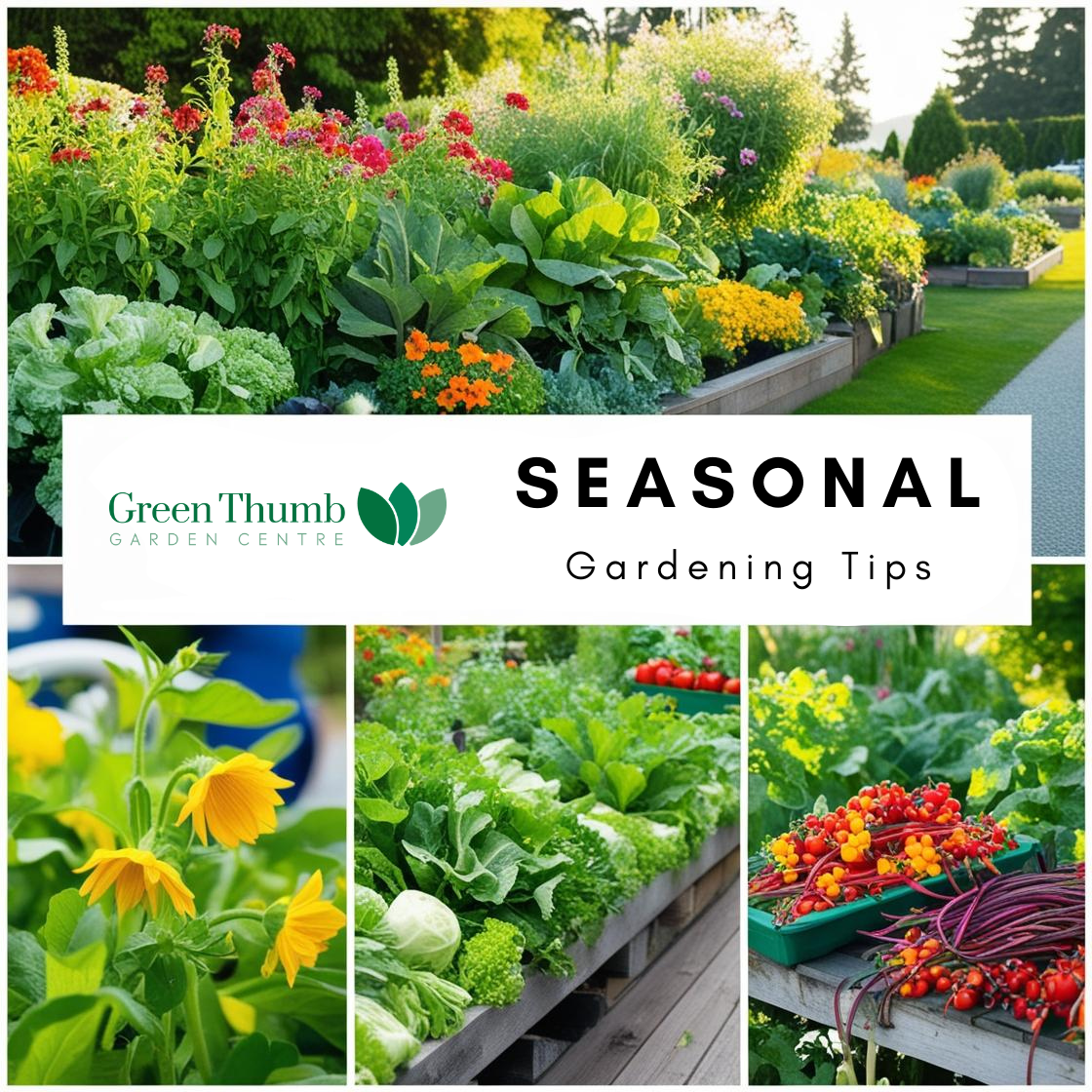Gardening on Vancouver Island brings its own set of seasonal rhythms, thanks to our mild, rainy winters and dry summers. Each season requires specific adjustments to ensure your plants stay healthy and resilient. Here’s a basic breakdown of essential tasks and care strategies for each time of year to use as a guideline.
Spring: Prepping Your Garden for Growth
Spring is an exciting time for gardeners of all ages and abilities, as plants begin to emerge from dormancy and the landscape bursts into life. This season is all about preparing the soil, planning new plantings, and giving existing plants the boost they need to thrive. It's also a great time of year to head into the Garden Centre in person to see what's new and chat with our knowledgeable staff. You can also use this website as a resource to know what's in stock and find out where in the centre it's located to make shopping easier.
- Soil Preparation: Spring is an ideal time to add compost or organic fertilizers to replenish soil nutrients. This is especially important if you have heavy clay or sandy soils, which are common in some Vancouver Island areas.
- Planting and Dividing: Early spring is perfect for planting new perennials, trees, and shrubs. It’s also a good time to divide crowded perennials like hostas and daylilies, which will improve their vigor and create new plants for your garden.
- Pruning: Prune shrubs and trees that bloom on new wood, like roses, as well as removing any winter-damaged branches. Be cautious with plants that bloom on old wood (like lilacs); prune these after flowering.
- Pest Prevention: As the weather warms, keep an eye out for emerging pests like aphids. Try environmentally friendly solutions like neem oil or introduce beneficial insects like ladybugs to control pests naturally.
Summer: Managing Heat and Drought
Vancouver Island’s summers are typically dry, which can stress plants if not managed properly. This season focuses on conserving moisture, regular maintenance, and keeping plants hydrated during hot spells. We also all need to consider the water restrictions that happen around this time of year on the Rock, so maybe consider a grey water or rain water collection system.
- Watering Practices: Deep watering is essential to encourage roots to grow deeper, making plants more resilient during droughts. Water early in the morning or late in the evening to minimize evaporation. Consider installing drip irrigation or soaker hoses to target water directly to plant roots.
- Mulching: Apply a layer of mulch around your plants to help conserve moisture, regulate soil temperature, and suppress weeds. Organic mulches, like shredded bark or compost, also break down over time, adding nutrients to the soil.
- Deadheading and Pruning: Remove spent blooms from perennials and annuals to encourage continuous flowering. Lightly prune summer-flowering shrubs after they bloom to keep them tidy and healthy.
- Pest and Disease Management: In the warmer months, fungal diseases can become more common. Watch for powdery mildew on plants like roses and zucchini, and use appropriate organic treatments if needed. Regularly inspect plants for signs of pest infestations and address them early.
Fall: Preparing for Cooler Weather
Fall is the time to ready your garden for winter, focusing on tasks like planting, mulching, and clearing debris to prevent pests and diseases.
- Planting Trees and Shrubs: Fall is the perfect time for planting trees and shrubs on Vancouver Island, as cooler temperatures and increased rainfall encourage root growth. Newly planted trees and shrubs will establish themselves over winter, giving them a strong start in spring.
- Dividing and Planting Perennials: Divide perennials to prevent overcrowding and improve their health. This is also a good time to plant spring bulbs like daffodils, tulips, and crocuses for an early splash of color next season.
- Adding Mulch for Winter Protection: A fresh layer of mulch helps insulate roots and retain moisture. Avoid piling mulch directly against plant stems, which can lead to rot.
- Soil Amendment: Add organic matter, such as compost or well-rotted manure, to your garden beds to improve soil structure and fertility over winter. This will also give perennials a nutrient boost when they begin growing in spring.
Winter: Protecting and Maintaining Dormant Plants
While winter is quieter in the garden, there are still essential tasks to prepare plants for the cold and rainy season. Vancouver Island’s winters are milder than many other regions, but frost and heavy rains can still affect plant health.
- Protecting Sensitive Plants: Some Mediterranean and tropical plants, like succulents, citrus trees or tender perennials, may need extra protection. Use frost cloths or bring potted plants indoors to keep them safe from frost damage.
- Reducing Watering: As temperatures drop, plants require less water. Keep an eye on soil moisture levels, especially for outdoor containers, which can become waterlogged during heavy rains.
- Pruning and Cleanup: Avoid heavy pruning during winter, as cuts can take longer to heal in cold, damp weather. Instead, focus on clearing debris from beds and paths to prevent mold and mildew buildup.
- Planning for Spring: Winter is a great time to plan for the upcoming growing season. Review which plants thrived and which struggled, and make notes on any changes you’d like to implement. Consider ordering seeds or planning new plantings so you’re ready to go when spring arrives.
By adapting your care routine with these seasonal tips, you can keep your garden thriving year-round. Each season brings its own challenges and opportunities, but with thoughtful preparation, you can support plant health and enjoy a beautiful, resilient garden through every change in the weather.
Remember that our staff are available in person or via email or phone to help answer any questions you may have. We are open from 9-5 seven days a week for your convenience.


